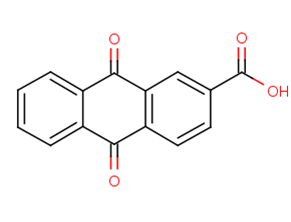
ANTHRAQUINONE-2-CARBOXYLIC ACID
CAS No. 117-78-2
ANTHRAQUINONE-2-CARBOXYLIC ACID( —— )
Catalog No. M17856 CAS No. 117-78-2
Anthraquinone-2-carboxylic acid acts as a potent anti-inflammatory and antinociceptive component in vivo, thus contributing to the immune regulatory role of fruits and herbs.
Purity : >98% (HPLC)
 COA
COA
 Datasheet
Datasheet
 HNMR
HNMR
 HPLC
HPLC
 MSDS
MSDS
 Handing Instructions
Handing Instructions
| Size | Price / USD | Stock | Quantity |
| 500MG | 45 | In Stock |


|
| 1G | Get Quote | In Stock |


|
Biological Information
-
Product NameANTHRAQUINONE-2-CARBOXYLIC ACID
-
NoteResearch use only, not for human use.
-
Brief DescriptionAnthraquinone-2-carboxylic acid acts as a potent anti-inflammatory and antinociceptive component in vivo, thus contributing to the immune regulatory role of fruits and herbs.
-
DescriptionAnthraquinone-2-carboxylic acid acts as a potent anti-inflammatory and antinociceptive component in vivo, thus contributing to the immune regulatory role of fruits and herbs.
-
In Vitro——
-
In Vivo——
-
Synonyms——
-
PathwayMicrobiology/Virology
-
TargetHIV
-
RecptorIRAK-1| Syk
-
Research Area——
-
Indication——
Chemical Information
-
CAS Number117-78-2
-
Formula Weight252.22
-
Molecular FormulaC15H8O4
-
Purity>98% (HPLC)
-
SolubilityIn Vitro:?DMSO : 25 mg/mL (99.12 mM)
-
SMILESc1ccc2c(c1)C(=O)c1c(C2=O)cc(cc1)C(=O)O
-
Chemical Name——
Shipping & Storage Information
-
Storage(-20℃)
-
ShippingWith Ice Pack
-
Stability≥ 2 years
Reference
1.Park JG,et al. Anti-Inflammatory and Antinociceptive Activities of Anthraquinone-2-Carboxylic Acid.Mediators Inflamm. 2016;2016:1903849.
molnova catalog



related products
-
Doravirine
Doravirine (MK-1439, MK1439) is a novel, highly specific HIV-1 nonnucleoside reverse transcriptase inhibitor (NNRTI) with IC50 of 12, 9.7, and 9.7 nM against WT, K103N, and Y181C reverse transcriptase (RT) mutants, respectively.
-
Ginsenoside Z-R1
Zingibroside R1 has anti-HIV-1 activity.
-
Benzalphthalide
Benzalphthalide is a chemical compound with anti-HIV activity.



 Cart
Cart
 sales@molnova.com
sales@molnova.com


